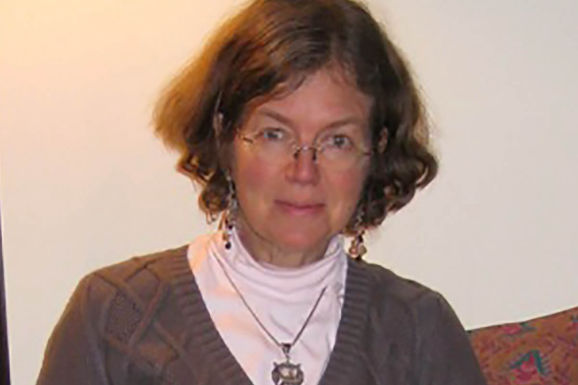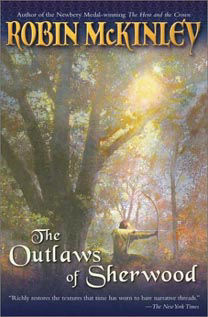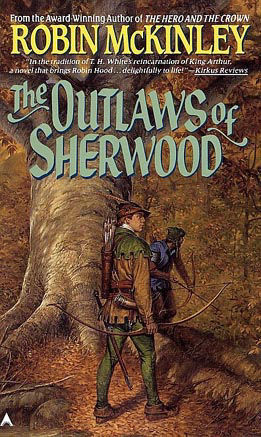Ordinary Heroes ... and Heroines (Marian and Cecily)
AWW: Many versions of the legend which focus solely on Robin
himself. But The Outlaws of Sherwood wonderfully develops the other characters
in the band. In your "Ordinary Heroes" article [which appears in Robin Hood:
The Many Faces of that Celebrated Outlaw, the catalogue for the International
Robin Hood Exhibition, organized by Dr. Kevin Carpenter], you said that
Little John was your favourite character. What's the appeal of Robin being
part of a team as opposed to being a solo hero?
RM: Another important aspect of Robin Hood for me -- an aspect
that was important when I was a kid and stayed with me even as I grew up
and lost patience with Howard Pyle -- is that he is a leader. And
you can't lead unless there is someone else around for you to lead.
The ordinary-hero business applies to leaders as well: the finest, clearest-seeing,
most worth paying attention to leader is also lying awake at 3 am occasionally,
wondering if he's doing the right thing. He better had be, or he's got
a problem, something that seems to me has gone wrong with a lot of charismatic
human leaders, now and throughout history. They start to believe their own
hype, and stop worrying. Deadly error. In Outlaws I tried to write
a story about a reluctant leader, a leader who inspired, who brought out
the best in people, who made them willing to risk danger and discomfort for
something they believed in -- and who didn't abuse the tremendous
power this gave him.
AWW: Obviously, Marian was an important figure for you. Often
in the legend, she's a very strong character. But in the children's books
of the last few hundred years, she's become a damsel in distress. How did
you come to craft your Marian -- one of the strongest and most interesting
ever? And you've mentioned coming under some criticism for your Marian. How
do others see Marian versus how you see Marian?
RM: . I'm not a scholar, and there are lots of Robin Hood
s out there I haven't read, but I've read quite a few, and I'm startled
at your statement 'Often in the legend, she's a very strong character.'
Not in the legends I know. (According to Professor Holt "Marian only made
her way into the legend via the May Games and that not certainly until the
sixteenth century." I suppose it also depends on how old a story has to
be before you start calling it a legend.) There's one reference in
one reasonably elderly ballad that I've seen that makes a passing
reference to her out there having adventures with the boys (-- outlawsandhighwaymen.com/drayton.html--
where you'll find an excerpt from Poly-Olbion by Michael Drayton, published
in 1622) but generally speaking, up till pretty recently, she's been at
home knitting or grilling the venison steaks or something, if she's there
at all. Marginal Marian would be a better name for her than Maid Marian.
As for where my Marian came from, she's a very straightforward progression,
given my shape of mind. I wanted a self-doubting imperfect inspirational-leader
hero, and I wanted him to have a sweetheart whom he honestly needed
, and who was -- equally honestly -- a full person, and a fully important
member of the band of outlaws, in her own right. Again -- for my shape of
mind-given that I wanted Robin to be a genuine leader, someone whom people
wanted to follow, and who took responsibility for what this
meant for both himself and his followers, I kind of had to take his
marksmanship away from him, because being a brilliant marksman too would
start taking him toward that too-good-to-be-true, bored-now place that I
as a reader object to. Who better to give that marksmanship to than his
true love, who needed something to do/be anyway? Mind you, it was nowhere
near that calculated-or that rational. My Robin turned up the way he turned
up, and so did my Marian. I'm just not in the least surprised.
AWW: In your afterword and elsewhere, you've mentioned the shortage
of women both in the traditional legend and especially in Howard Pyle. You've
added several female Merry M -- err, Women to Robin's band. What went into
creating these characters, particularly Cecily?
RM: Again, I didn't set out to do it deliberately. It was inevitable,
if I was going to tell a Robin Hood story, that my story would have important
women in it. If there's ever a book published with my name on it that
doesn't have important women characters in it, call the police.
I've been kidnapped, and someone has stolen my name.
I can't give you much more than that for Cecily, either. (For
anyone who is reading this who hasn’t read Outlaws yet but might,
stop reading now.) But I went in to writing this story,
as I go into writing any story, with some ideas about how I'm guessing
the story may go (I am frequently wrong), and two of them in this case came
together in Cecily: that Will Scarlet, the runaway aristocrat, had a rebellious
sister whose fate was mysterious; and that it seemed very likely that a
young woman might, to improve her chances of being accepted into a band of
mostly merry men , present herself as a young man. It's important
to my concept of the story that Cecily, when Cecil is finally unmasked,
is right , that she wouldn't have been accepted -- not to the extent
she has been -- if they'd known she was a woman. If Robin Hood is what
each reteller needs him to be (pace Professor Holt's thesis in his excellent
Robin Hood ), one of the things I needed him to be was embroiled
in an ongoing argument about the place of women in society, which is very
alive to me in this society.



Contact Us